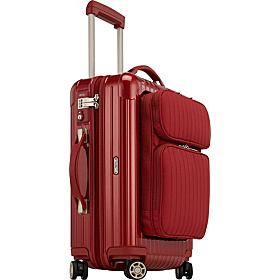Travel News
The Evolution of Hard-Shell Luggage
If you’ve traveled lately, it’s been hard to miss the latest trend in luggage: colorful, shiny, hard-sided suitcases. Our gadget and gear expert Phil Baker looks at the evolution of hard-shell luggage and the hottest new suitcases on the market.
This popularity of hard-shell suitcases stems from their lightweight style and durability. The best of these products can even withstand the weight of a person standing on the case. While the case may collapse to the floor, it’s designed to snap right back when the person steps off. Hard cases are more water resistant than conventional fabric luggage and do a better job of protecting their contents. With the increased fees for checking baggage, their lighter weight can make a difference in avoiding a hefty surcharge. The disadvantages are that they are more difficult to over-stuff and some users report non-repairable dents and cracks, particularly on the cheaper products.
 Rimowa, a German company, introduced the first polycarbonate suitcases in 2000. The designs were a follow-on to their aluminum cases, which had been used to protect expensive equipment. Their 100 percent Polycarbonate luggage used the same iconic design elements–a pattern of vertical ribbed grooves–that today’s suitcases are using.
Rimowa, a German company, introduced the first polycarbonate suitcases in 2000. The designs were a follow-on to their aluminum cases, which had been used to protect expensive equipment. Their 100 percent Polycarbonate luggage used the same iconic design elements–a pattern of vertical ribbed grooves–that today’s suitcases are using.
I’ve used a Rimowa bag off and on for almost a year and like it for some trips. It’s a bare-bones design that’s basically an expensive plastic box with wheels and a handle, and has limited capacity. Their current version of what I’m using is the Rimowa Salsa Deluxe 21″ Cabin MultiWheel Hybrid, which retails for $695. The main difference is a change to the wheel design from two large to four smaller ones that allow easier maneuverability and the ability to push the suitcase along smooth floors. These bags are typically called spinners.
There are now lots of choices, including models from Tumi, Briggs & Riley, and Samsonite. I’ve been trying out the newly released Briggs & Riley Torq International Carry-on Spinner that costs $479.
While both the Rimowa and Torq are made of varying strength polycarbonate, their designs are quite different. The Rimowa is a simple, classic design while the Briggs & Riley looks more high tech with its complex shape designed to incorporate many new features. Both are high quality and come with long warrantees, 5 years for the Rimowa and a lifetime warranty for the Briggs & Riley.
According to the company, the Torq was in development for three years, much longer than most of its other products. They began with a clean sheet of paper to come up with a design that offered the most function, highest capacity and best performance. Wearing my design-engineering hat, that comes through loud and clear. The product wears some of its functionality in its looks and details, much as a Range Rover or Jeep stands apart from its competition.
Whereas other products have a 50/50 split between the bottom and top lid, the Torq has an 80/20 split that makes packing much easier. You can pack it on a luggage rack without the lid being opened 180 degrees. I found its capacity to be about 20 percent greater than the Rimowa.
One of the best features of the Torq is a large compartment that runs the full length of the front with padded pocket for storing a notebook and iPad, as well as other items that you may need to keep handy.
The Torq also incorporates one of the latest trends, 4-wheel assemblies that rotate 360 degrees for easy mobility. Each assembly has two wheels with rubber treads mounted onto ball bearings and a steel shaft for durability, all made in Japan. Other details abound, including an ID card holder, a second bag carrier strap, and an easily accessed control panel with a combination lock for TSA access. The Torq still is relatively lightweight at 8.9 pounds and lighter than similar-sized conventional ballistic nylon luggage. Because of its good looks, large capacity, lightweight, and easy maneuverability, I’ve been using this for all of my trips.
For more luggage reviews and news you can use, check out:
- New Luggage & Gear Designed to Prevent Theft
- The Best Luggage Innovations of 2013
- Luggage Trends: The One Bag Solution
- The Best Luggage for 2013
By Phil Baker for PeterGreenberg.com












